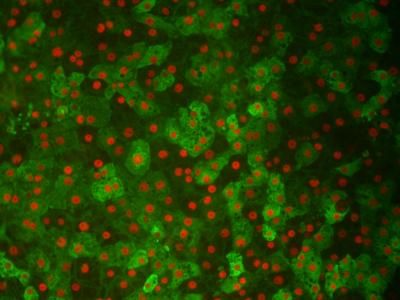New research on structure of bones raises questions for treatment of osteoporosis and other bone disorders
Researchers have discovered that the structure of human bones is vastly different than
Advertisement
Researchers from the University of Cambridge, the Animal Health Trust in Newmarket, and the BAM Federal Institute of Materials Research and Testing, Berlin, have discovered that the characteristic toughness and stiffness of bone is predominantly due to the presence of specialized sugars, not proteins, as had been previous believed. Their findings could have sweeping impacts on treatments for osteoporosis and other bone disorders.
Scientists have long held the view that collagen and other proteins were the key molecules responsible for stabilizing normal bone structure. That belief has been the basis for some existing medications for bone disorders and bone replacement materials. At the same time, researchers paid little attention to the roles of sugars (carbohydrates) in the complex process of bone growth.
For this research, funded by the Biotechnology and Biological Sciences Research Council (BBSRC), the UK and Berlin teams studied mineralization in horse bones using an analysis tool called nuclear magnetic resonance (NMR). They found that sugars, particularly proteoglycans (PGs) and glycosaminoglycans (GAGs), appear to play a role which is as important as proteins in controlling bone mineralization - the process by which newly-formed bone is hardened with minerals such as calcium phosphate.
Dr David Reid, from the Duer Group, Department of Chemistry,at the University of Cambridge, who played a significant part in the research, said, "We believe our findings will alter some fundamental preconceptions of bone biology. On a practical level they unveil novel targets for drug discovery for bone and joint diseases, new biomarkers for diagnosis, and new strategies for developing synthetic materials that could be used in orthopaedics.
"They may also strengthen the rationale for the current popularity of over-the-counter joint and bone pain remedies such as glucosamine and chondroitin, which are based on GAG sugar molecules."
Most read news
Topics
Organizations
Other news from the department science

Get the life science industry in your inbox
By submitting this form you agree that LUMITOS AG will send you the newsletter(s) selected above by email. Your data will not be passed on to third parties. Your data will be stored and processed in accordance with our data protection regulations. LUMITOS may contact you by email for the purpose of advertising or market and opinion surveys. You can revoke your consent at any time without giving reasons to LUMITOS AG, Ernst-Augustin-Str. 2, 12489 Berlin, Germany or by e-mail at revoke@lumitos.com with effect for the future. In addition, each email contains a link to unsubscribe from the corresponding newsletter.























































